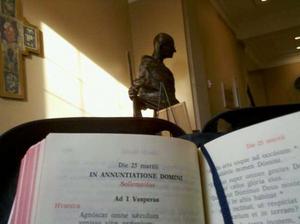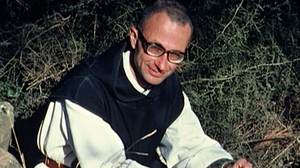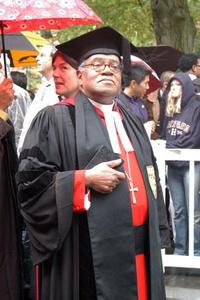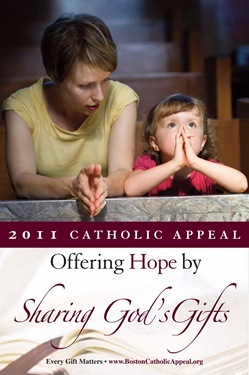Culture: March 2011 Archives
A striking line in Gerard Manley Hopkins' poem "The Leaden Echo and the Golden Echo," "Give beauty back, beauty, beauty, beauty, back to God, beauty's self and beauty's giver." English Jesuit priest Gerard Manley Hopkins (1844-1889) was renowned for his use of Blessed John Duns Scotus' theology and his creative use of language and rhythm (notice Hopkins' characteristic stresses on certain words).
The Leaden Echo and the Golden Echo(Maiden's song from St. Winefred's Well)
The Leaden Echo
How to kéep--is there ány any, is there none such, nowhere known some, bow orbrooch or braid or brace, láce, latch or catch or key to keep
Back beauty, keep it, beauty, beauty, beauty, ... from vanishing away?
Ó is there no frowning of these wrinkles, rankéd wrinkles deep,
Dówn? no waving off of these most mournful messengers, still
messengers, sad and stealing messengers of grey?
No there 's none, there 's none, O no there 's none,
Nor can you long be, what you now are, called fair,
Do what you may do, what, do what you may,
And wisdom is early to despair:
Be beginning; since, no, nothing can be done
To keep at bay
Age and age's evils, hoar hair,
Ruck and wrinkle, drooping, dying, death's worst, winding sheets, tombs and worms and
tumbling to decay;
So be beginning, be beginning to despair.
O there 's none; no no no there 's none:
Be beginning to despair, to despair,
Despair, despair, despair, despair.

Lenten observances are varied: you can fast, pray the Way of the Cross, do charitable acts, give alms, spend time in contemplative prayer before the Blessed Sacrament, do lectio divina, pray the rosary, and the like. The possibilities are limitless. You might know, Catholics have a lot in their own mystical tradition to deepen a relationship with the Blessed Trinity. And some real good stuff, too. So much so, that a Catholic doesn't have to stray far from orthodox Christianity for prayer.
Doubtful, however, is the spending any kind of energy on "Gandhi, Peace and Nonviolence" an acceptable alternative for Catholics. Especially when knowledge of the Catholic tradition is relatively low, even among theology students. But that is what the Boston College School of Theology and Ministry's Lenten focus was today. The idea is OK. Wait. It was pretty mediocre. Why not reflect upon peace and nonviolence using music and select readings? At a Catholic school of theology and ministry where students are paying tuition in order to be trained to be better Catholics, superb lay Catholic leaders and teachers, and perhaps even priests, Gandhi just doesn't fit during Lent.
I wonder if anyone at a Jesuit school of theology and ministry ever thought of focusing on one of the great spiritual fathers and mothers of the Church --Augustine, Ephrem, Aquinas, Bonaventure, Lawrence of Brindisi, Hilary of Poiters, Loyola, Gertrude, Tauler, Marguerite d'Oingt, Catherine of Siena, Giussani, Lubich, Benedict XVI-- for Lenten prayer and readings? Then, I have to wonder if Gandhi is BC's type of Catholic and the list above are too obscure for mainline believers. Are these people too Catholic? Perhaps Gandhi is the new patron saint of the liberal-blue hairs and they haven't told the rest of the Church yet? Curious to know what Sister Quinn was thinking.
This is not only a question of Catholic identity at a supposed Catholic institution of higher education, but a question of formation for the proclamation of the Kingdom of God. It is a question of helping each other know their destiny in Jesus Christ.
Archbishop Claudio Maria Celli, president of the Pontifical Council for Social Communications, has urged Catholics to evangelize the "digital culture." He made his remarks on March 18. A common theme spoken of in recent weeks from various Vatican officials, including Pope Benedict. Celli's office has been working overtime in recent weeks in tackling media in its various forms. And one must remember that it has taken aliong time to get where we are today, thanks in part to the good work of many laity, lower clergy and a Franciscan Sister of the Eucahrist Sister Judith Zoebelein. The Vatican has been on the web since 1995.
Archbishop Celle told L'Osservatore Romano in a March 17 interview that after Easter, the Holy See will launch a new news website that will gather all the Vatican media services into one portal in English, French and Italian with the hope to offer its media services in additional languages.
 One of the NY "news" rags that I periodically glance at (no pun intended) told me that a study at the University of Bristol (UK) determined that chickens are people. I didn't know that. Did you? Here's the story:
One of the NY "news" rags that I periodically glance at (no pun intended) told me that a study at the University of Bristol (UK) determined that chickens are people. I didn't know that. Did you? Here's the story:Chickens have feelings, according to British veterinarians. The researchers took a group of mother hens and their chicks and blew puffs of air at the chicks. This caused the birds distress and sent their heart rates up, reducing the temperature of their eyeballs --a well-known sign of stress. The mother hens showed exactly the same signs of stress when they were hit with puffs of air, too ...
A few days ago I recommended seeing "Of Gods and Men." Last week I saw the film and I have still been thinking of the movie, the monks, the hard work of inter-religious dialog. The testament of Dom Christian de Cherge can be read here. I highly recommend reading what Prior Christian said and what others think. A group of friends took time to see the movie together. Two friends brought a perspective of the film to my attention recently. The following is an an answer to those who ask whether a desire for God is still present in our times. Angelo Scola writes:
I believe that the worldwide success of the film on the Tibhirine monks [U.S. Title: "Of Gods and Men"] reflects a burning desire in the men and women of any latitude to meet the face of God; it therefore reflects the real need we all feel for authentic witnesses who may help us keep our gazes focused upwards.
Authentic witness is, in fact, not limited to "giving a good example". It shines in all its wholeness as a method for practically knowing reality and communicating truth. It is a primary value, standing above any other form of knowledge and communication - scientific, philosophical, theological, artistic, etc.

A luminous example of this method is offered by the very words which Fr Christian de Chergé, prior of the Trappist monastery of Notre-Dame de l'Atlas in Tibhirine, Algeria, wrote in his spiritual will [noted above], a good three years before he was massacred with his monks:
"When the time comes, I would like to be able to have an instant of lucidity that would allow me to ask for the pardon of God and that of men, my brothers, while forgiving with all my heart those who may have hit me... I cannot see how I could, in fact, rejoice in that this people I love could be accused of my assassination. It
 The very colorful minister, the Reverend Peter J. Gomes, who served at Harvard for more than 40 years, died last evening. Reverend Gomes oversaw the ministries of Memorial Church and delivered a rousing Easter sermon each year. He was an accomplished and stimulating writer, teacher and preacher.
The very colorful minister, the Reverend Peter J. Gomes, who served at Harvard for more than 40 years, died last evening. Reverend Gomes oversaw the ministries of Memorial Church and delivered a rousing Easter sermon each year. He was an accomplished and stimulating writer, teacher and preacher. 

